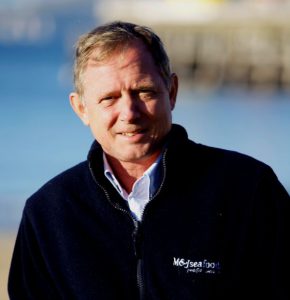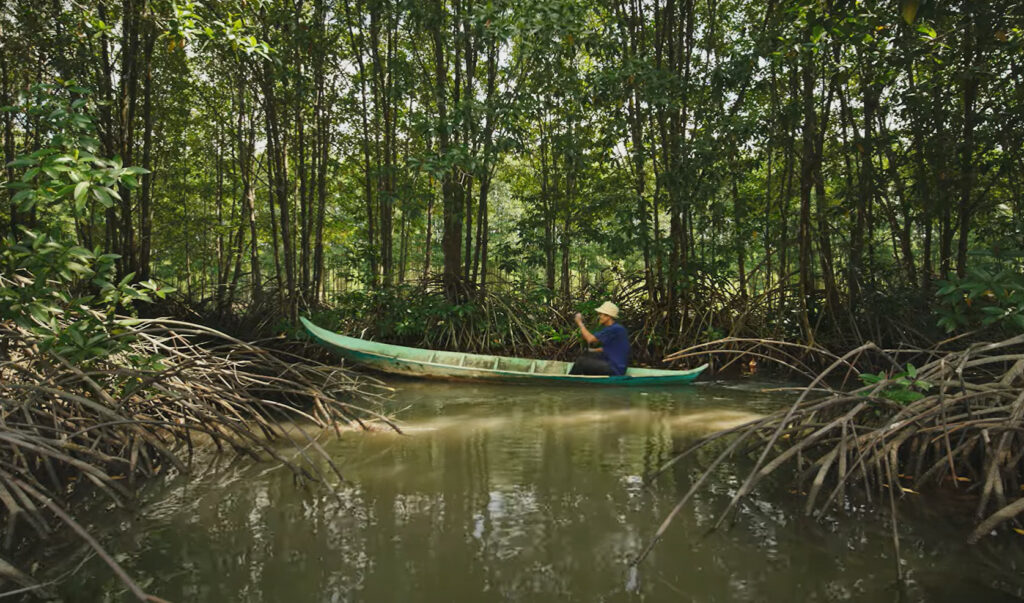M&J Seafood’s Mike Berthet: UK’s Sustainable Seafood Locksmith
Editor’s note: The following column is part of a series of columns written by GAA Communications Manager Steven Hedlund. Titled “Communicator’s Corner,” the column profiles aquaculture and seafood professionals whose leadership, sense of innovation and emphasis on education and communication set them apart. The column will also appear in the January-February 2015 edition of the Global Aquaculture Advocate.
When it comes to chefs’ seafood-purchasing decisions in the United Kingdom, Mike Berthet acts as a locksmith — opening the door to seafood farmed or caught in a responsible manner and closing the door on seafood produced in a questionable, unsustainable way — all while juggling the day-to-day responsibilities of sourcing seafood.
Berthet is director of fish and seafood for M&J Seafood, the United Kingdom’s largest independent seafood supplier, offering fresh, frozen and live seafood to more than 12,000 chefs nationwide. M&J Seafood is a division of Europe’s largest foodservice provider, the Brakes Group.
A qualified chef with 30-plus years of seafood experience, Berthet represents M&J on sustainability-related issues and ensures that the company’s passion and commitment to responsibly sourced seafood is maintained. Berthet’s fervor for seafood and the ocean dates to his days traveling the world with the UK’s Merchant Navy. After years of working in the kitchen at sea, he had “the good fortune” meeting of Marion and Jeff Archer, who founded M&J Seafood in 1978. He joined the company in 1984, and his love of seafood has only grown since then.
I caught up with Berthet in late November, soon after he joined the Global Aquaculture Alliance board of directors, to chat about everything from his influence on UK chefs to the importance of third-party certification.
 Hedlund: Your job description says you ensure that M&J Seafoods’ passion and commitment to responsibly sourced seafood is maintained. What do you do on a day-to-day basis to ensure that the company is maintaining the balance of providing quality seafood to its customers while fulfilling its passion and commitment to responsibly sourced seafood?
Hedlund: Your job description says you ensure that M&J Seafoods’ passion and commitment to responsibly sourced seafood is maintained. What do you do on a day-to-day basis to ensure that the company is maintaining the balance of providing quality seafood to its customers while fulfilling its passion and commitment to responsibly sourced seafood?
Berthet: Balance is a good word! Basically, I work both sides of the street. On the one hand, I encourage chefs to review their menus. We train chefs face-to-face to a City & Guilds-accredited standard encompassing both seafood knowledge and sustainability and how to make the right choices when it comes to menu planning. On the other hand, I work with NGOs, scientists and government officials to really understand which species should be avoided and which species are safe and sustainable choices. I also work with fishermen to look at how they can modify their fishery to enable a more long-term sustainable business by protecting future stocks.
Hedlund: M&J Seafood is the UK’s largest independent seafood supplier. Can you speak to the influence you have as the company’s director of fish and seafood, in terms of your customers’ seafood-purchasing decisions? How heavily do your customers lean on you to make “the right choice” when it comes to sourcing seafood responsibly?
Berthet: Our customers have come to rely on us to give them peace of mind when it comes to choosing seafood, and we have made this even simpler by creating our Safely Sourced Seafood List, which any chef can use to choose from more than 330 fresh, frozen and live seafood products. The Safely Sourced Seafood List comprises seafood rated 1 to 3 by the Marine Conservation Society or certified sustainable to the Marine Stewardship Council’s environmental standard.
Hedlund: Conversely, what influence do your customers have, in terms of consumers’ seafood-purchasing decisions? In the UK, how heavily do consumers lean on chefs and foodservice providers to make “the right choice” when it comes to sourcing seafood responsibly? High-profile chefs can be quite influential.
Berthet: We work very closely with influential chefs such as Raymond Blanc, who believes passionately in chefs being totally committed to building sustainability and seasonality into everything that goes onto their menu. I regard chefs as the gatekeeper of thier menu. They decide what goes on it. But, ultimately, I am the locksmith. I decide what we will and, more importantly, will not sell to them. This way I can help chefs avoid threatened species that they should not be looking to put on their menu.
Hedlund: What’s your customers’ level of awareness in terms of the importance of aquaculture as a source of seafood — that wild fisheries production has essentially leveled off globally and that aquaculture is the only sustainable means of increasing the seafood supply to meet the world’s food needs? Are they familiar with the concept of third-party certification and what it takes to produce farmed seafood responsibly?
Berthet: We encourage our chefs to feature farmed seafood on their menu. Even if they don’t include it, we show them why ultimately they will have to. In my experience, the UK is leading the world in terms of familiarity with aquaculture certification. We will launch more than 20 Best Aquaculture Practices-certified king prawn products in January 2015. This is being driven by market demand and our commitment to eventually offer only third-party certified farmed seafood.
Hedlund: You and your foodservice and retail colleagues tackled a number of issues at GAA’s GOAL 2014 conference, including environmental responsibility, social welfare, food safety, animal health and welfare, and consumer education. What would you rank as your customers’ top three concerns when it comes to seafood?
Berthet: Social welfare is at the top of the agenda. Eradicating any form of slave labor or child exploitation has to be top of mind. The environment is next. We have just the one planet, and we are the caretakers for our future offspring. It is absolutely incumbent upon us to look after it and its resources, because there is no way back. Finally, there’s education. It’s not only about educating the consumer. We all need to be better educated. Without education, how will aquaculture farmers feed an ever burgeoning populating without destroying our environment or depleting wild-capture fisheries? How will fisherman improve the way they fish and protect the environment? How will wholesalers, chefs and consumers be able to make the right choices and balance what we use of the planet’s resources?




